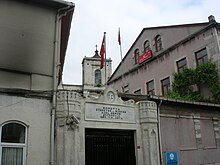Church of St. George of Samatya
| Church of St. George of Samatya Սամաթիոյ Սուրբ Գէորգ Եկեղեցի |
|
|---|---|
| Surp Kevork | |

The entrance of the modern church viewed from north
|
|
| 41°00′07″N 28°55′59″E / 41.00188°N 28.93302°ECoordinates: 41°00′07″N 28°55′59″E / 41.00188°N 28.93302°E | |
| Location | Samatya, Istanbul |
| Country | Turkey |
| Denomination | Armenian Apostolic |
| History | |
| Founder(s) | Romanos III Argyros |
| Dedication | St. Mary Peribleptos |
| Cult(s) present | St. George |
| Architecture | |
| Architect(s) | Bedros Nemtze |
| Groundbreaking | 1866 |
| Completed | 1887 |
Saint George of Samatya or Surp Kevork (Armenian: Սամաթիոյ Սուրբ Գէորգ Եկեղեցի; Turkish name: Sulu Manastiri, meaning: "Water Monastery") is an Armenian church in Istanbul.
The edifice, built between 1866 and 1887, has been erected above the substructure of a Byzantine church and monastery built in the eleventh century. The complex, dedicated to St. Mary Peribleptos (Greek: Μονὴ τῆς Θεοτòκου τῆς Περιβλὲπτου, Monì tis Theotókou tis Perivléptou) was one of the most important Greek Orthodox monasteries in Constantinople. After the Ottoman conquest of the city in 1453 it was ceded to the Armenian community in Istanbul, and became for a period the seat of the Armenian Patriarchate of Constantinople.
The church is located in Istanbul, in the district of Fatih, in the neighbourhood of Kocamustafapaşa (historically Samatya), at Marmara Caddesi 79. It lies inside the walled city, at a short distance from the shore of the Sea of Marmara. The building is protected by a high wall, and surrounded by other edifices.
In the fifth century on this place stood the church of Hagios Stephanos en tais Aurelianai. This church was located near the Helenianai Palace and the monastery of St. Dalmatios, close to an abundant water source (Greek: Hagiasma). From this source, still existing, originates the Turkish name of the complex ("Water Monastery").
...
Wikipedia

